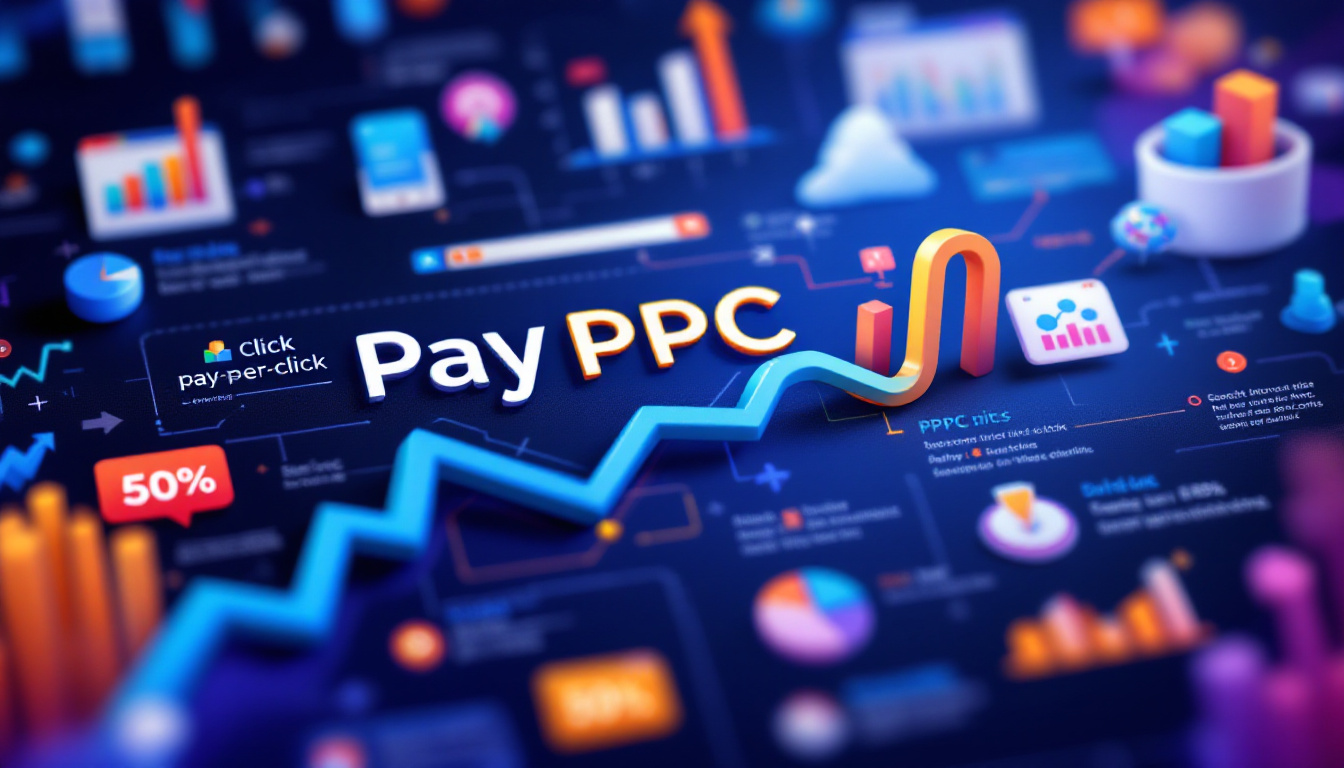The Beginner's Guide to PPC Advertising in Louisville, KY

PPC advertising, or pay-per-click advertising, has emerged as a powerful tool for businesses seeking to reach their target audience effectively. In Louisville, KY, where the competition can be fierce, understanding the fundamentals of PPC is essential for driving traffic and conversions. This guide will take you through the key aspects of PPC advertising, from what it is to how to measure its success.
What is PPC and how does it work?
PPC, or pay-per-click, is an online advertising model where advertisers pay each time a user clicks on one of their ads. It is primarily used to direct traffic to websites, where the advertiser aims to convert visitors into customers. PPC is commonly associated with search engines like Google and platforms such as Facebook and LinkedIn.

The core of PPC advertising lies in auction-based bidding. Advertisers bid on keywords that are relevant to their products or services. When a user searches for those keywords, the advertising platform displays their ads, and the advertiser pays the bid amount each time someone clicks on their ad. This model allows for a highly targeted approach to reach potential customers at the moment they are searching for specific services or products.
One of the significant advantages of PPC is its ability to provide measurable results almost instantly. Advertisers can track key performance indicators (KPIs) such as click-through rates (CTR), conversion rates, and return on investment (ROI) in real-time. This data-driven approach enables businesses to optimize their campaigns effectively, adjusting bids, ad copy, and targeting parameters to improve performance. Additionally, PPC allows for A/B testing, where different versions of ads can be tested against each other to determine which performs better, further enhancing the effectiveness of marketing strategies.
Moreover, PPC is not limited to just search engines; it extends to display networks, social media platforms, and even mobile apps. This versatility allows advertisers to reach audiences across various channels, catering to different user behaviors and preferences. For instance, social media PPC campaigns can leverage demographic targeting, allowing businesses to tailor their ads to specific age groups, interests, and locations. This level of customization ensures that the right message reaches the right audience, maximizing the chances of engagement and conversion.
Why PPC is ideal for businesses in Louisville, KY
Louisville, known for its rich history, vibrant culture, and growing economy, offers a unique marketplace for local businesses. Utilizing PPC advertising can be particularly advantageous in this regional landscape. The city’s diverse demographic, from the bustling downtown area to the suburban neighborhoods, provides a fertile ground for targeted advertising strategies that can resonate with specific consumer groups.
Moreover, the local events and festivals, such as the Kentucky Derby and the Forecastle Festival, create seasonal spikes in consumer interest. Businesses can leverage PPC campaigns to capitalize on these events, tailoring their ads to align with the heightened activity and engagement during these periods. This not only enhances visibility but also fosters a connection with the community, as businesses can promote special offers or services that cater to the influx of visitors and locals alike.
- Targeted Reach: With geographical targeting, businesses can focus their ads on consumers within Louisville, making their marketing efforts more effective. This means that a local restaurant can specifically target food lovers in nearby neighborhoods, ensuring that their promotions reach the right audience.
- Quick Results: Unlike SEO strategies that may take months to show results, PPC can deliver immediate traffic and potential leads. For businesses launching new products or services, this immediacy can be crucial in gaining market traction.
- Cost-Effectiveness: Businesses can set their budget and only pay for ads when potential customers engage with them, making PPC a scalable option for companies of all sizes. This flexibility allows startups and established enterprises alike to experiment with different strategies without the risk of overspending.
- Competitive Edge: In a competitive market like Louisville, PPC can help businesses stand out, ensuring they appear at the top of search results. This visibility is particularly important for industries such as hospitality and retail, where first impressions can significantly influence consumer choices.
Additionally, the ability to track and analyze PPC campaigns in real-time allows businesses to refine their strategies quickly. By monitoring which ads perform best, companies can adjust their messaging, target different demographics, or even shift budgets to maximize ROI. This data-driven approach not only enhances the effectiveness of advertising efforts but also fosters a culture of continuous improvement, essential for thriving in Louisville’s dynamic marketplace.
How to set up a PPC campaign step-by-step
Setting up a PPC campaign can seem daunting, but following a step-by-step approach can simplify the process. Here's how to get started:

- Define Your Goals: Determine what you aim to achieve with your PPC campaign. Common goals include increasing website traffic, generating leads, or enhancing brand awareness.
- Identify Your Target Audience: Understand who your ideal customer is, including demographics, interests, and online behaviors. This information will help tailor your ad messaging and targeting.
- Choose the Right Platform: Decide whether to advertise on Google Ads, Bing Ads, or social media platforms like Facebook or Instagram, depending on where your audience spends most of their time.
- Keyword Research: Use tools like Google Keyword Planner to find relevant keywords with good search volume and manageable competition.
- Create Compelling Ads: Write eye-catching ad copy that highlights your offerings and includes a clear call to action. Incorporate keywords to improve ad relevance.
- Set Your Budget: Decide on a daily or monthly budget and set bids for your keywords. Monitor spending to ensure you stay within budget.
- Launch Your Campaign: After reviewing all elements, launch your campaign and start monitoring its performance.
Once your campaign is live, it’s crucial to continuously analyze its performance metrics. Utilize tools like Google Analytics to track clicks, conversions, and overall ROI. This data will provide insights into what’s working and what may need adjustments. For instance, if certain keywords are driving traffic but not converting, consider refining your ad copy or landing page to better align with user expectations. Additionally, A/B testing different ad variations can help you identify the most effective messaging and visuals.
Another important aspect to consider is the ongoing optimization of your campaign. Regularly review your keyword performance and adjust bids accordingly. You may find that some keywords perform exceptionally well, while others may need to be paused or removed. Furthermore, keep an eye on your competitors’ strategies; understanding their approach can provide valuable insights and help you stay ahead in the competitive landscape of PPC advertising. By staying proactive and adaptable, you can maximize the effectiveness of your PPC efforts and achieve your marketing goals more efficiently.
Tips for choosing the right PPC keywords
Selecting the appropriate keywords is crucial for the success of any PPC campaign. Here are some tips to guide your keyword selection process:
- Focus on Relevance: Choose keywords that are highly relevant to your business offerings. Think from the perspective of potential customers and what they might search for.
- Use Long-Tail Keywords: Long-tail keywords may have lower search volumes but often lead to higher conversion rates since they cater to specific queries.
- Analyze Competitors: Keep an eye on the keywords your competitors are targeting. This can provide insights into what works in your industry.
- Utilize Negative Keywords: Implement negative keywords to prevent your ads from showing up for irrelevant searches, helping you save on costs.
In addition to these strategies, consider leveraging keyword research tools that can provide valuable data on search volume, competition, and trends. Tools like Google Keyword Planner, SEMrush, or Ahrefs can help you uncover hidden gems that may not be immediately obvious. These platforms often offer suggestions based on your initial keywords, enabling you to expand your list and discover new opportunities that align with your business goals.
Furthermore, regularly reviewing and updating your keyword list is essential for maintaining the effectiveness of your PPC campaigns. The digital landscape is constantly evolving, and so are consumer behaviors and search trends. By conducting periodic audits of your keyword performance, you can identify which keywords are driving traffic and conversions, and which ones may need to be adjusted or replaced. This proactive approach not only enhances your ad relevance but also optimizes your budget allocation, ensuring that your PPC efforts yield the best possible return on investment.
How to track and measure success in PPC
Once your PPC campaign is running, tracking its performance is vital for understanding its effectiveness and optimizing it further. Below are key metrics to monitor:
- Click-Through Rate (CTR): This percentage shows how often people click on your ad after seeing it. A high CTR indicates that your ad is relevant to your audience.
- Conversion Rate: Measure how many clicks lead to desired actions, such as purchases or sign-ups. This metric reflects the effectiveness of your landing page.
- Cost Per Click (CPC): Monitor how much you are paying for each click. Understanding your CPC helps in calculating return on investment (ROI).
- Return on Ad Spend (ROAS): Evaluate the revenue generated for every dollar spent on PPC. A strong ROAS indicates a successful advertising effort.
Additionally, tools like Google Analytics and the ad platforms' built-in analytics can provide deeper insights into user behavior and ad performance. Regularly reviewing these metrics will help you fine-tune your PPC strategies and achieve better results.
In conclusion, PPC advertising can be a game-changer for businesses in Louisville, KY. By understanding its workings, defining clear goals, choosing the right keywords, and continuously measuring success, local businesses can leverage PPC to enhance visibility, drive traffic, and ultimately increase conversions. Implementing these strategies can help you make the most of your PPC efforts in a competitive marketplace.

As a Google Ads expert, I bring proven expertise in optimizing advertising campaigns to maximize ROI.
I specialize in sharing advanced strategies and targeted tips to refine Google Ads campaign management.
Committed to staying ahead of the latest trends and algorithms, I ensure that my clients receive cutting-edge solutions.
My passion for digital marketing and my ability to interpret data for strategic insights enable me to offer high-level consulting that aims to exceed expectations.